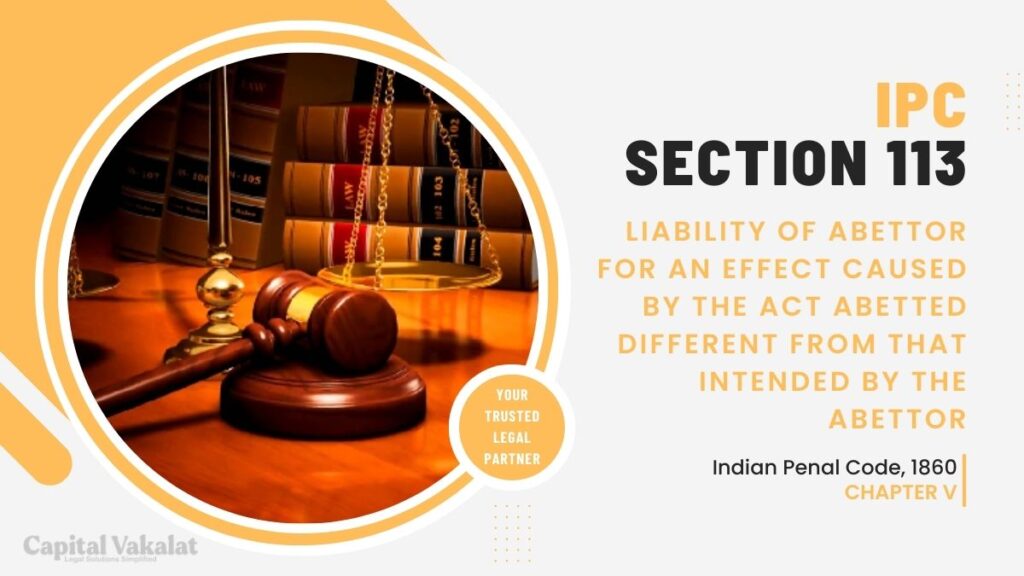In the realm of criminal law, every action has consequences. The Indian Penal Code (IPC) is a comprehensive legal document that outlines various sections and their applications. Section 113 IPC delves into the complex issue of abettor liability when the effect caused by the act abetted differs from the abettor’s initial intention.

Introduction to Section 113 of the IPC
Section 113 of the IPC plays a pivotal role in distinguishing between an abettor’s intention and the actual consequences of their actions. It highlights the importance of causation in criminal proceedings, and understanding its nuances is crucial for lawyers, judges, and anyone interested in the Indian legal system.
Understanding the Concept of Abettor
An abettor is someone who aids, encourages, or supports another person in committing a crime. Abetment involves actively participating in or facilitating the commission of an offense. It’s essential to establish the role of the abettor in any criminal case.
Abettor’s Intent vs. Actual Consequences
Section 113 IPC addresses situations where the effect of the act abetted is different from the abettor’s intended outcome. This distinction is vital in determining the abettor’s liability and punishment.
Elements of Section 113 IPC
To invoke Section 113, certain elements must be present, including a clear abettor, the abetted act, and an unintended effect. Understanding these elements is crucial for both prosecutors and defense lawyers.
The Act Abetted: Different from the Intention
This section focuses on instances where the abettor’s intention doesn’t align with the result. This may lead to intricate legal debates and discussions about whether the abettor should be held responsible for outcomes they didn’t anticipate.
The Concept of ‘Cause’
Causation in criminal law is a multifaceted concept. Establishing a direct link between the abettor’s actions and the unintended effect is essential. Lawyers often rely on expert testimony and evidence to make their case.
Causation in Criminal Law
Criminal liability depends on proving causation. If the abettor’s actions are a substantial cause of the unintended effect, they may be held accountable. This is a delicate balance in the legal system.
Liability of the Abettor
Section 113 IPC aims to clarify the abettor’s liability for outcomes they didn’t foresee. It helps ensure that abettors are held accountable for their actions, even if the result was unintended.
Criminal Liability vs. Moral Responsibility
The legal system distinguishes between criminal liability and moral responsibility. An abettor may not feel morally responsible for unintended consequences, but they can still be held criminally liable.
Case Law Analysis
To comprehend the practical application of Section 113 IPC, it’s important to explore case law. Several landmark cases have helped shape the interpretation and enforcement of this section.
Proving Section 113 IPC in Court
Proving an abettor’s liability under Section 113 IPC can be challenging. The burden of proof lies with the prosecution, and it requires a comprehensive understanding of the legal nuances involved.
Challenges and Controversies
Like any legal provision, Section 113 IPC has its share of challenges and controversies. Some argue that it can be misused or misinterpreted, leading to unjust outcomes.
Role of Intent in Legal Proceedings
The element of intent is central to criminal proceedings. Understanding how the legal system considers intent and its impact on the abettor’s liability is essential.
Punishments and Penalties
This section addresses the potential punishments and penalties for abettors under Section 113 IPC. The severity of the punishment depends on various factors, including the gravity of the unintended effect.
Conclusion
Section 113 IPC addresses a significant aspect of criminal law – abettor liability for outcomes they didn’t intend. It underscores the complexity of causation and the need for a comprehensive legal framework. Understanding this section is essential for all stakeholders in the legal system.
FAQs
How does the legal system determine the unintended effect of an abetted act?
The legal system examines the causation between the abettor’s actions and the unintended effect. If there’s a substantial connection between the two, the abettor may be held liable for the unintended consequence.
Can an abettor avoid criminal liability if the effect is different from their intention?
No, an abettor cannot evade criminal liability if the effect of the abetted act differs from their intention. Section 113 IPC emphasizes that they can be held responsible for the consequences, whether intended or not.
What role does intent play in criminal proceedings under Section 113 IPC?
Intent is a crucial factor in determining the abettor’s liability. It helps establish whether the abettor’s actions had a direct link to the unintended effect, making them criminally responsible.
Are there any recent cases that have brought Section 113 IPC into the spotlight?
Yes, recent cases have highlighted the significance of Section 113 IPC in the Indian legal system. These cases often involve complex legal arguments and discussions about abettor liability for unintended consequences.